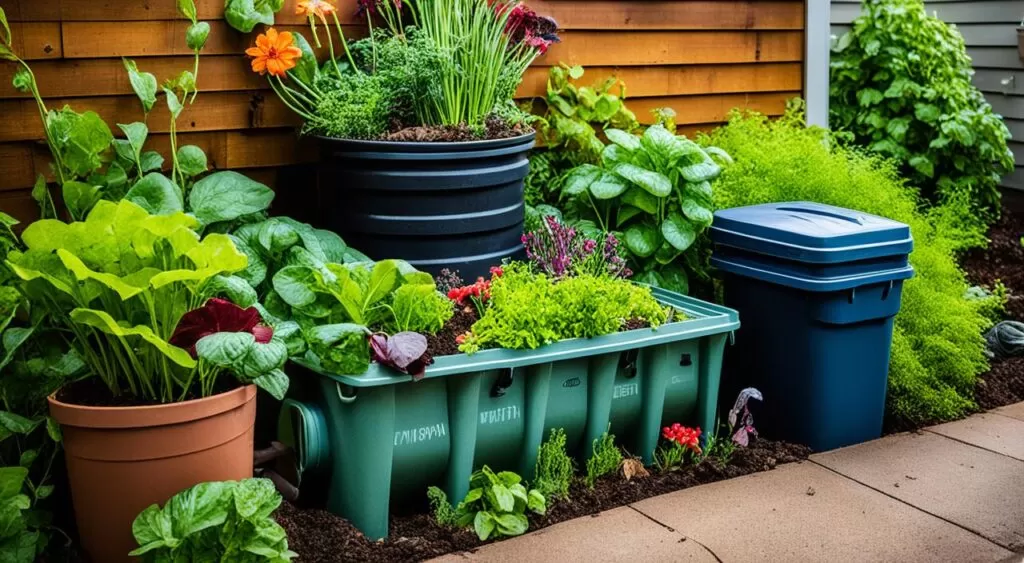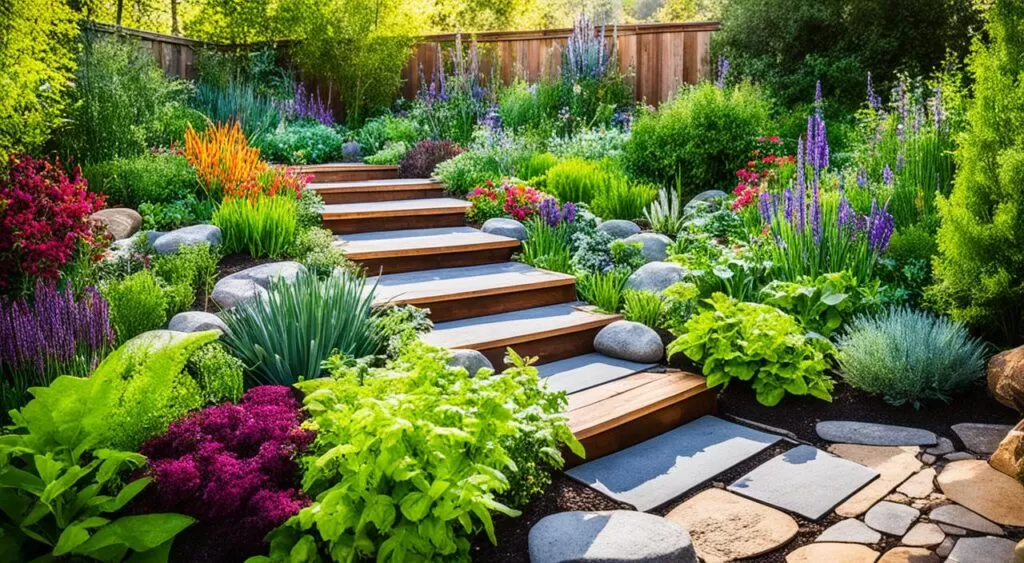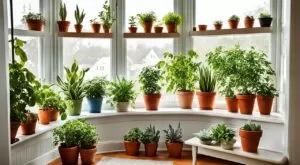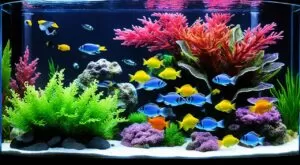Creating a sustainable garden is good for the environment and your outdoor space. By using simple practices, you can make your garden a place that helps local wildlife and cuts down on environmental harm. We’ll share five easy tips to make your garden eco-friendly and beautiful.

Key Takeaways
- Embrace sustainable gardening practices to reduce your environmental footprint
- Compost garden and food waste to enrich your soil naturally
- Choose native and drought-resistant plants to support local ecosystems
- Implement water conservation techniques to minimize resource usage
- Adopt organic pest control and weed management methods
Sustainable Gardening Practices
Creating a sustainable garden helps us reduce our environmental impact and enjoy nature’s beauty and abundance. Key practices make your garden a thriving, eco-friendly space.
Composting Garden and Food Waste
Composting turns organic waste into a nutrient-rich soil conditioner. This reduces the need for synthetic fertilizers and helps soil hold moisture better. By composting, you turn waste into a resource for your plants.
Selecting Native and Drought-Resistant Plants
Choose plants that are native to your area for your garden. They need less water and care, making them a sustainable choice. Drought-tolerant plants also work well, needing less water. These plants help you save resources and create a sustainable garden.
| Sustainable Gardening Practices | Benefits |
|---|---|
| Composting Garden and Food Waste | Reduces the need for synthetic fertilizers Diverts organic waste from landfills Improves soil moisture retention |
| Selecting Native and Drought-Resistant Plants | Require less water and maintenance Adapt to local climate conditions Conserve natural resources |
Using these sustainable gardening practices makes your garden better for the environment and your health. Stay tuned for more tips to improve your outdoor space!
Water Conservation Techniques
In the garden, water is a precious resource that needs careful use. By using eco-friendly methods, gardeners can cut down on water use. This helps with water conservation efforts.
Installing a rain barrel to catch roof runoff is a smart move. This water can feed your plants, cutting down on the need for city water. Choosing xeriscaping with drought-tolerant plants is also key to saving water. These plants need less water, making them a green choice.
Using drip irrigation systems helps water plants better, avoiding waste. Switching from regular lawns to ground covers, native plants, and mulch saves water too.
| Water Conservation Technique | Benefits |
|---|---|
| Rain Barrels | Collects rainwater for plant irrigation, reducing dependency on municipal water |
| Xeriscaping | Utilizes drought-tolerant, native plants that require less water |
| Drip Irrigation | Efficiently delivers water directly to plant roots, minimizing waste |
| Lawn Alternatives | Ground covers, native plants, and mulch-covered areas require less water than traditional lawns |
By adopting these water-saving methods, gardeners help protect this essential resource. They keep their outdoor spaces green and eco-friendly.

5 Eco-Friendly Tips for Caring for Your Garden
Keeping an eco-friendly garden is good for the planet and can save you money. Here are five tips for sustainable gardening:
- Embrace Recycled Materials: Use recycled items like cardboard, newspaper, and plastic bottles for mulch and watering cans. This reduces waste and saves resources.
- Go Hand-Powered: Choose hand-powered garden tools over gas-powered ones. This cuts down on harmful emissions and makes gardening better for the environment.
- Cultivate Native and Drought-Resistant Plants: Pick plants that are native and can handle drought. They need less water and care, which is better for the planet.
- Compost Garden and Food Waste: Start a compost pile for your garden and food waste. Composting enriches the soil and feeds your plants naturally.
- Implement Water Conservation Techniques: Water your plants only when they need it, about two to three times a week. Using rainwater for irrigation helps save this precious resource.
By following these eco-friendly tips for caring for your garden, you help make the future greener. You also get to enjoy your garden more.
Organic Pest Control and Weed Management
Traditional pesticides and herbicides harm the environment and our health. Instead, try Integrated Pest Management (IPM) with natural methods. This method keeps your garden healthy and balanced.
Natural Pest Control Methods
Begin by removing weeds by hand, a safe way to control them. Attracting helpful insects like ladybugs and praying mantises also helps. Use organic pesticides like insecticidal soaps and oils, which are kinder to the earth.
Try using beer or milk traps for slugs, and let chickens eat lawn grubs. These are great ways to naturally control pests.
For weeds, use organic pre-emergent herbicides. Mulching and using tools like the swan neck hoe can also help. Make sure to check your compost pile to stop weed seeds from spreading.
By choosing organic pest control and natural weed management, you can make your garden better. You’ll attract beneficial insects and avoid harmful organic pesticides.
Conclusion
Using sustainable gardening and eco-friendly landscaping makes your garden beautiful and easy to care for. It also helps the environment. By composting, picking plants that need less water, saving water, and skipping harmful chemicals, you help your garden and the planet.
Planting trees to help wildlife and grow your own food are great ways to make your garden better. These actions make your garden lush and help the environment. Start making your outdoor space a green haven today.
Even small steps can greatly improve your garden’s sustainability. Whether you’re experienced or new to gardening, you can add more green practices. With creativity and effort, you can make a beautiful space for you and nature.
FAQ
What are some sustainable gardening practices to incorporate at home?
Sustainable gardening means avoiding harmful chemicals in fertilizers and pest control. It also means saving natural resources and cutting down on waste. Using fewer chemicals and making your own compost is key to sustainable gardening.
How can composting benefit a sustainable garden?
Composting turns waste into a powerful soil booster. It helps you make your own natural fertilizer. This cuts down on synthetic fertilizers, reduces waste, and keeps soil moist.
What are the benefits of choosing native and drought-resistant plants?
Pick plants that fit your local climate for a low-maintenance garden. Drought-tolerant plants need less water. These choices make your garden sustainable and easy to care for.
How can you conserve water in the garden?
Use rain barrels and xeriscaping to save water. Drip irrigation and replacing lawns with drought-friendly plants also help. Mulch and native plants are great for saving water too.
What are some other eco-friendly gardening practices to consider?
Use recycled stuff like cardboard and plastic bottles for mulch and watering tools. Gardening by hand helps avoid harmful emissions. It’s a green way to garden.
How can you manage pests and weeds organically?
Use natural ways to fight pests and weeds instead of harsh chemicals. Hand-weed, attract helpful bugs, and opt for organic sprays. This keeps your garden safe and healthy.





